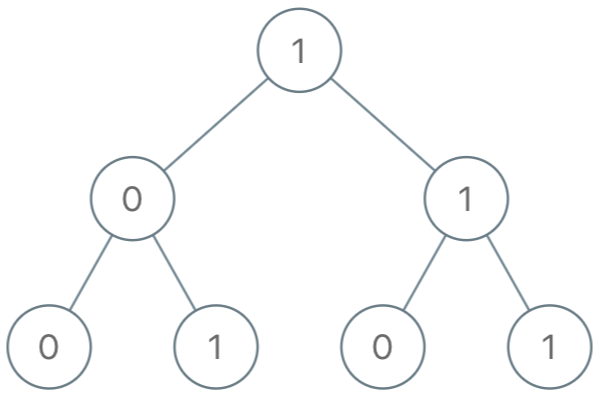LV. Easy 😎
https://leetcode.com/problems/sum-of-root-to-leaf-binary-numbers/
Sum of Root To Leaf Binary Numbers - LeetCode
Level up your coding skills and quickly land a job. This is the best place to expand your knowledge and get prepared for your next interview.
leetcode.com
문제
You are given the root of a binary tree where each node has a value 0 or 1. Each root-to-leaf path represents a binary number starting with the most significant bit.
- For example, if the path is 0 -> 1 -> 1 -> 0 -> 1, then this could represent 01101 in binary, which is 13.
For all leaves in the tree, consider the numbers represented by the path from the root to that leaf. Return the sum of these numbers.
The test cases are generated so that the answer fits in a 32-bits integer.
Example 1:

Input: root = [1,0,1,0,1,0,1]
Output: 22
Explanation: (100) + (101) + (110) + (111) = 4 + 5 + 6 + 7 = 22
Example 2:
Input: root = [0]
Output: 0
Constraints:
- The number of nodes in the tree is in the range [1, 1000].
- Node.val is 0 or 1.
문제 해결법
처음에 함수 파라미터로 뭐가 들어오는지 확인도 안 하고, 문제만 읽고 이상한 풀이법을 많이 생각했다.
트리가 완전 이진트리라고 생각해서 deep를 구한 후, 이진수를 구하지 않고 각 노드별로 최대 몇 번 사용되나를 계산하면 쉽다고 생각했는데.. 구현하려고 보니 nodelist도 인자를 받아야 된다
그래서 그냥 조합을 다 만들어서 문제를 해결했다!
easy였지만 고민을 굉장히 많이 한 문제였다.. 처음에 잘못 생각해서 그런가..🥺
코드는 굉장히 간단!
root부터 시작해서 노드를 거칠 때마다 val을 str에 저장하여 뒤의 노드가 없을 때 10진수로 변환하여 값을 더해주면 끝~
해결 코드
class Solution {
private:
int ans;
void cal(string str) {
int length = str.length() - 1;
for (int i = length; i >= 0; --i) {
ans = ans + pow(2, length - i) * (str[i] - 48);
}
cout << ans << endl;
}
public:
int sumRootToLeaf(TreeNode* root) {
ans = 0;
setComb(root, to_string(root->val));
return ans;
}
void setComb(TreeNode *temp, string str) {
if (temp->left) {
setComb(temp->left, str + to_string(temp->left->val));
}
if (temp->right) {
setComb(temp->right, str + to_string(temp->right->val));
}
if (!temp->right && !temp->left)
cal(str);
}
};
'Computer Science > 알고리즘' 카테고리의 다른 글
| leetcode 452) Minimum Number of Arrows to Burst Balloons (0) | 2022.01.14 |
|---|---|
| leetcode 701) Insert into a Binary Search Tree (0) | 2022.01.12 |
| leetcode 67) Add Binary (0) | 2022.01.10 |
| leetcode 1041) Robot Bounded In Circle (0) | 2022.01.09 |
| leecode 1463) Cherry Pickup II (0) | 2022.01.08 |




댓글